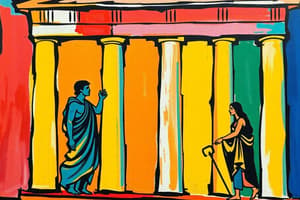Podcast
Questions and Answers
According to Aristotle, what is the primary reason people come together to form a polis?
According to Aristotle, what is the primary reason people come together to form a polis?
- To protect themselves from external threats
- To achieve their full potential as human beings (correct)
- To fulfill their selfish interests
- To participate in the governing process
What is the main principle of Nicolo Machiavelli's 'Political realism'?
What is the main principle of Nicolo Machiavelli's 'Political realism'?
- The ruler should prioritize the welfare of citizens
- Morality and ethics should guide political decisions
- The end justifies the means (correct)
- Politics should be based on religious principles
Why, according to Aristotle, do people who live outside the city-state not have the opportunity to develop their potentialities?
Why, according to Aristotle, do people who live outside the city-state not have the opportunity to develop their potentialities?
- Because they are not citizens of the polis (correct)
- Because they are women
- Because they are not part of the governing process
- Because they are slaves
What is the purpose of a constitution, according to the text?
What is the purpose of a constitution, according to the text?
What will happen, according to the text, if there is prevailing injustice in society?
What will happen, according to the text, if there is prevailing injustice in society?
What is the basis of the social contract, according to the text?
What is the basis of the social contract, according to the text?
According to John Locke's theory, where does the supreme power lie?
According to John Locke's theory, where does the supreme power lie?
What is the basis for the rights provided by liberalism, according to Karl Marx?
What is the basis for the rights provided by liberalism, according to Karl Marx?
What is the predicted outcome of the class conflicts according to Karl Marx?
What is the predicted outcome of the class conflicts according to Karl Marx?
What is the term used by John Locke to describe the ultimate source of power?
What is the term used by John Locke to describe the ultimate source of power?
What is the philosophy that predicts the events of the class conflicts and the emergence of a new society?
What is the philosophy that predicts the events of the class conflicts and the emergence of a new society?
What is the relationship between the executive authority and the legislature, according to John Locke?
What is the relationship between the executive authority and the legislature, according to John Locke?
Flashcards are hidden until you start studying
Study Notes
What is Politics?
- Human beings are political by nature because they help each other to meet basic needs.
- The concept of the polis, where people participate in administration and governing, is essential to understanding politics.
Aristotle's View
- Aristotle believed that humans have the opportunity to develop their potentialities in the state.
- People who live outside the city-state do not have this opportunity.
- Only those who participate in the administration and governing of the polis are regarded as citizens.
- Workers, slaves, and women do not have the right to participate in the political process.
The Concept of Constitution
- A constitution is the essence of the state.
- It exists to limit the power of the government, which is the core idea of constitutionalism.
The Best State
- The best state should be composed of a community of equals.
- Revolution will occur if there is prevailing injustice in society.
Human Nature
- Nicolo Machiavelli believed that human beings are selfish or self-interested by nature.
- The only way to survive is by being selfish.
Nicolo Machiavelli's View
- Machiavelli dedicated "The Prince" to Lorenzo de Medici.
- He believed that politicians can use any methods to achieve their objectives, which is the basis of "political realism".
- Machiavelli's principle of "end justifies the means" separates politics from ethics and morality.
- He advocated for keeping religion and ethics away from politics.
Social Contract
- The social contract is an agreement where government is established by the consent of the people.
- The responsibility of the rulers is to protect "life, liberty, and property" of the people.
- Failure to do so will result in people revolting against the ruler.
- The contract is not absolute, but conditional.
John Locke's Theory
- Locke believed in the theory of popular sovereignty, where supreme power lies in the hands of the people.
- The legislature should have supreme authority, and the executive authority is subject to the legislature.
- The people have the power to alter or remove the legislature if it fails to function.
Economic Motives
- John Locke believed that man's actions at all times are dominated by economic motives.
- Liberalism depicts society in a way that prevents people from understanding the alienation and exploitation by capitalism.
Karl Marx's View
- Marx believed that the development of human society is driven by the interplay of economic forces.
- Class conflicts lead to the working class overthrowing the capitalist, and creating a new society with no distinction between poor and rich.
- The state and its agencies will wither away, which is known as Dialectical Materialism.
- Communism is not the same as Marxism.
Studying That Suits You
Use AI to generate personalized quizzes and flashcards to suit your learning preferences.




